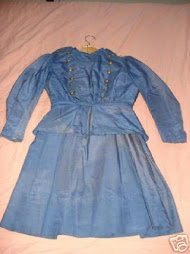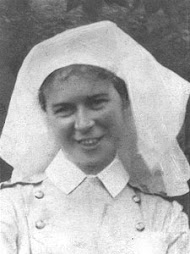Happy new year to all the readers of Finding the Forty-Seven. During the holidays, I caught the tail-end of another continuation of the Finding the Fallen television series. Once again, the team was on the hunt for another fallen soldier of the First World War. The show is really well done and I'm glad it is being continued. However, I felt again the great lack of interest shown by producers of such programs in the experience of the women of the First World War--especially those who served in various capacities during the conflict. According to Arthur Marwick's excellent book Women at War 1914-1918, there were over 7,000 women served in the Royal Army Medical Corps during the war. Nearly 8,000 served in the Queen Mary's Army Auxiliary Corps. Over 2,400 served as nurses in the Canadian Army Medical Corps. Not to mention, of course, the tens of thousands of women worldwide who worked in munitions factories. Some of these women gave their lives (munitions workers often died later of chemical related causes). Yet television producers seem strangely uninterested in their experience. A colleague who pitches shows to History Channel recently told me that those in charge of the channel believe that women aren't interested in history, so it's unlikely that they will produce programs related to women and the first war any time soon. Such a view is wrong on all kinds of levels. I have taught history on a number of occasions and often have more women than men in my classes. I also believe that women aren't the only ones interested in women's contributions to war. Information for the following story about a nurse from the Great War, for instance, has been contributed by a male reader, David Smith.
Carola Douglas Revisited
Le Treport, France, August 28, 1915. It was a scorching hot afternoon at the Canadian General Hospital in Le Treport, France. Twenty-three-year-old William Henry "Harry" Patrick had been returned to his ward following surgery. Patrick had been a Nottingham miner before the war and was now a private in “C” Company of the 2nd Battalion Sherwood Forresters. He had suffered terrible wounds and was anxious that his family should know how he was doing. Nursing Sister Carola Douglas was sitting beside him, YMCA letterhead on her knee, preparing a letter home on his behalf:
Dear Mrs. and Mr. Patrick and family:
I am writing these few lines for your son who was operated on this morning and is feeling rather upset. He had some shrapnel taken out of his leg. His condition this morning is a little serious as it always is after an operation, it will hurt. But in a few days he will be feeling much more able to write for himself. In the meantime I shall drop you a line every day. He is a good patient. It will be my pleasure to see that he wants for nothing. Will you kindly tell his wife. I am,
Very sincerely
Carola J. Douglas
Nursing Sister
Unfortunately, Harry died on August 31st. Carola Douglas also died during the war. However, the story does have a hopeful twist. Harry had married on May 24, 1915. During his short honeymoon, a child was conceived. That child was contributor David Smith’s grandmother!
Thanks to David for sharing this story and a copy of the original letter from Carola Douglas. If any other readers have stories they’d like to share about nurses of the first war, please forward them to me and I will be glad to post them. I am gathering more information on other fallen nurses and hope to do another blog before then end of the month.
Subscribe to:
Post Comments (Atom)






















No comments:
Post a Comment